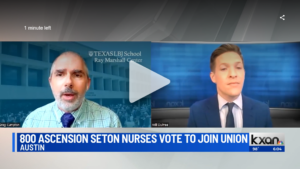RMC Research Associate Cynthia Juniper was interviewed recently by Texas Standard on pandemic-era staffing shortages in the childcare sector. “Compared to pre-pandemic levels, Texas’ childcare industry remains understaffed” aired October 17, 2022. You can read a transcript of and listen to the interview here.
Issue 33, September 2022
Dr. Cumpton Interview on Growing Labor Movement and Unionization in Central Texas
 Yesterday Dr. Greg Cumpton provided his input to Will Dupree at KXAN on the growing labor movement and unionization in the Central Texas region in response to Ascension Seton nurses voting to unionize. He notes in his follow-up LinkedIn post:
Yesterday Dr. Greg Cumpton provided his input to Will Dupree at KXAN on the growing labor movement and unionization in the Central Texas region in response to Ascension Seton nurses voting to unionize. He notes in his follow-up LinkedIn post:
“With high demands from employers, a tight labor market, and inflation eating away at American’s pocket books, employees are hoping to use collective power to increase access to better benefits and pay. Historically positive attitudes from workers around unions have recently increased. According to Gallup, 71% of Americans view unions favorably, the highest measure since 1965.*
With a particularly tight labor market, employers have been offering signing bonuses, higher salaries, and generous benefits to draw new employees. But sometimes existing workers do not receive these same incentives. Unionizing and speaking collectively is one way existing employees might work with employers to seek similar supports. From October 2021 through March of 2022, union representation petitions filed at the National Labor Relations Board have increased 57%.
*Interesting fact, the only year since tracking began that approval dipped below 50% was in 2009.”
Child Care Market Rate/Cost of Quality Studies
| Principal Investigators: | Daniel G. Schroeder, PhD (Principal Investigator) – Ray Marshall Center Monica Faulkner (Principal Investigator), Laura Marra (Co-Principal Investigator) – Texas Institute for Child and Family Wellbeing |
| Sponsor: | Texas Workforce Commission |
| Project Duration: | July 2022 – June 2025 |
| Description: | Researchers at The University of Texas at Austin will provide services in order to complete two annual studies for the Texas Workforce Commission. The Texas Institute for Child and Family Wellbeing at the Steve Hicks School of Social Work will manage data collection from child care providers. The Ray Marshall Center at the LBJ School of Public Affairs manages the data analysis and reporting.
The purpose of the Child Care Market Rate Study is to create statistical summaries of market rates for child care for the entire state of Texas and for each of the 28 Local Workforce Development Areas. The purpose of the Cost of Quality Study is to understand the cost of providing quality child care in the state of Texas. The purpose is to provide estimates of how much more additional funding, in terms of daily rates, should be paid to providers who meet quality standards to care for children, relative to how much providers who meet minimal standards are paid. |
| Reports Available: | The reports for this project are published through the Texas Institute for Child & Family Wellbeing at the University of Texas at Austin’s Steve Hicks School of Social Work. The following reports are available on their website.
2023 Texas Child Care Market Rate Survey |
RMC welcomes new Social Science Research Associate, David McCoy
 The Ray Marshall Center hired a new Social Science Research Associate (SSRA V), David McCoy, on September 6, 2022. Mr. McCoy comes to the RMC from the University of Pittsburgh’s Department of Political Science, where he earned a master’s in political science before pursuing a PhD (currently ABD). He will work on a range of projects with the RMC, including research on education policy and the development of panel data sets that extract insights from individual- and firm-level unemployment insurance data.
The Ray Marshall Center hired a new Social Science Research Associate (SSRA V), David McCoy, on September 6, 2022. Mr. McCoy comes to the RMC from the University of Pittsburgh’s Department of Political Science, where he earned a master’s in political science before pursuing a PhD (currently ABD). He will work on a range of projects with the RMC, including research on education policy and the development of panel data sets that extract insights from individual- and firm-level unemployment insurance data.
Prior to joining the Center, David has focused on the impacts of social assistance policy innovations in local Brazilian government, using mixed methods research design. He has experience generating useful insights from complex, observational data in a range of settings. Recent projects include: the automated coding of 150,000 transcribed statements by legislators to identify the salience of subject matter form a custom dictionary of terms; using quasi-experimental methods, such as matching and difference-in-differences, to identify the short- and medium-term economic shocks to local economies following an unexpected mass migration event in Brazil; and modeling the workplace network density of public sector employees to test differing network structures are associated with greater job satisfaction.
Read more about David here.
Hire Local Evaluation
| Principal Investigator: | Greg Cumpton, PhD |
| Sponsor: | Workforce Solutions Capital Area |
| Project Duration: | April 2022 – December 2024 |
| Description: | The Ray Marshall Center has partnered with Workforce Solutions Capital Area to provide services to collect, analyze, and report data outcomes under the Hire Local Plan. |
| Reports Available: |
CareerAdvance® Implementation Study Final Report: Findings from 2006 through FY 2021
CareerAdvance® Implementation Study Final Report: Findings from 2006 through FY 2021
Authors: Cynthia Juniper and Chris King
Date: April 2022
Publication Type: Report, 74pp.
Prepared for the Health Profession Opportunity Grant Program, Administration for Children and Families, U.S. Department of Health and Human Services.
This report examines the implementation of CareerAdvance® particularly focusing on how and why the program changed and adjusted to meet the requirements of HPOG, while responding to the needs of the participants being served, the local job market, the partners working together to implement the program, and the influence of the COVID-19 pandemic on service delivery. This report draws from previous CareerAdvance® reports, administrative information on the HPOG II program participants and their families, and interviews with the leadership and staff of CAP Tulsa, Tulsa Tech, Family and Children Services, Workforce Tulsa, and Tulsa Community WorkAdvance.
CAREER Project Evaluation
| Principal Investigator: | Greg Cumpton, PhD |
| Sponsor: | Greater Austin Chamber of Commerce |
| Project Duration: | February 2022 – May 2024 |
| Description: | The CAREER Project (Trellis Foundation’s Regional Ecosystem Innovation for Reskilling/Upskilling in Texas) aims to create a network of postsecondary and employment support for individuals in the Central Texas community impacted by the COVID-19 pandemic by building out widescale infrastructure like a referral map and integrated marketing and data efforts. The Ray Marshall Center has partnered with the Greater Austin Chamber of Commerce to evaluate the CAREER Project. |
| Reports Available: |
Dr. Greg Cumpton named Co-Director
The LBJ School’s Dean JR DeShazo recently selected Dr. Greg Cumpton to serve as Co-Director of the Ray Marshall Center along with Dr. Heath Prince.
Dr. Greg Cumpton joined the Ray Marshall Center in 2004 as a Graduate Research Assistant. During his time at the Center, he served as a Systems Analyst, a Social Science Research Associate V, a Research Associate, and Associate Director, prior to being named Co-Director. Greg received his Bachelor of Science degree in Mathematics from the University of Nebraska at Omaha, and his Master of Public Affairs and his Doctorate in Public Policy from the LBJ School of Public Affairs.
Greg’s research focuses on finding solutions to poverty. He says, “Poverty is a trap that once individuals and their families fall into may take many decades and even generations to escape. Poverty collectively cascades its effects across entire regions, producing lower educational attainment, poorer long-term health consequences, and reduced economic output. All of which hamper the ability of individuals and their families to reach their full potential. We must acknowledge and address the personal and societal barriers faced by those trapped by poverty.” Much of his work concentrates on the evaluation of education and training programs, ensuring that program completers find high quality jobs which improve initial and long-term income.
Greg contributes to local activities intended to provide a greater voice for workers. Greg has served for six years as the Leadership Development Committee lead on the Board of Black Star Co-op, a member-owned worker-run brewpub. BSCO’s Workers’ Assembly enacts and advocates for worker-focused policies, including paying a living wage, providing healthcare, paid time off, and paid sick leave. Greg is serving his third year as the UT Staff Council representative for District 302, which represents the LBJ School of Public Affairs and the School of Information. He currently serves as chair of the Health and Wellness Committee, which “supports and advocates for initiative and projects that increase staff access to, and awareness of, health and wellness programs and benefits.” Greg also volunteers his time as the Community Advancement Network (CAN) Dashboard Steering Committee Chair. The CAN dashboard contains numerous socio-economic indicators measuring the health, safety, and well being of those living in the Austin area.
As Co-Director, Greg’s additional duties include serving as the outreach and dissemination leader of the Center, leading construction and dissemination of our newsletter, social media, and website, and representing the Center in local, state, and national contexts. This year his efforts will include developing and utilizing existing standardized research training modules for new staff and graduate research assistants. By January 2023, he will revise the Center’s strategic plan to align more closely with both the LBJ School and The University of Texas.
Please congratulate Greg on his new position.
Nuru Ethiopia 2021 Impact Report
Nuru Ethiopia 2021 Impact Report
Authors: Ashweeta Patnaik and Heath Prince (Ray Marshall Center); Tatek Amataw (Nuru Ethiopia); and Casey Harrison, Matt Lineal, and Ian Schwenke (Nuru International)
Date: June 2022
Publication Type: Report, 20pp.
This report is commissioned by Nuru International.
Since 2016, the Ray Marshall Center has provided technical assistance to Nuru International’s monitoring and evaluation (M&E) team. The Center’s experience and expertise support Nuru’s work in Kenya, Ethiopia, and Nigeria by demonstrating the effectiveness and robustness of its integrated approach to addressing poverty. This report presents Nuru Ethiopia’s 2021 impact results for farmer cooperatives and rural livelihoods programming. RMC researchers found that Nuru interventions led to higher agricultural yield as well as higher additional incomes for Nuru farmer households while building a foundation of sustainable cooperative businesses.
- « Previous Page
- 1
- 2
- 3
- 4
- 5
- …
- 40
- Next Page »




